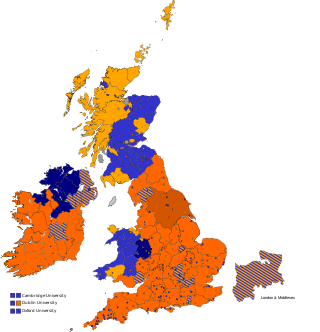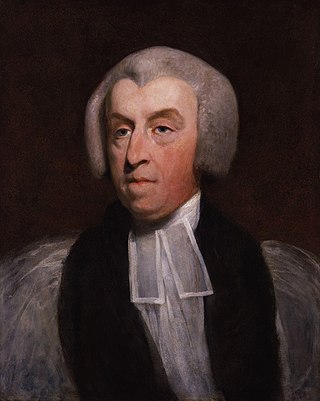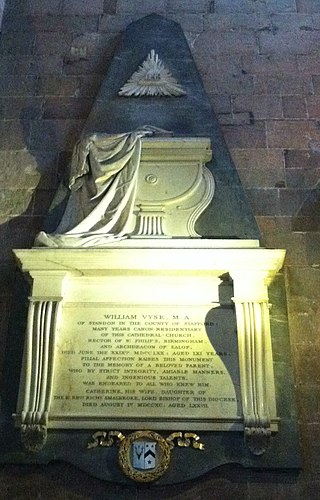Related Research Articles

Baron Sandford is a title that has been created twice, both times in the Peerage of the United Kingdom. The first creation came in 1891 when Sir Francis Sandford, a civil servant who played an important role in the implementation of the Elementary Education Act 1870, was made Baron Sandford, of Sandford in the County of Salop. He was the son of Sir Daniel Sandford, politician and Greek scholar, the grandson of the Right Reverend Daniel Sandford, Bishop of Edinburgh, the brother of Daniel Sandford, Bishop of Tasmania, and the first cousin of the Right Reverend Charles Sandford, Bishop of Gibraltar. He was childless and the title became extinct on his death in 1893.
William Ormsby-Gore, known as William Gore until 1815, was a British Member of Parliament.

Shropshire was a constituency of the House of Commons of the Parliament of England, then of the Parliament of Great Britain from 1707 to 1800, and of the Parliament of the United Kingdom from 1801 to 1832. It was represented by two Knights of the Shire. It was split into North Shropshire and South Shropshire in 1832.

The history of post-confederation Canada began on July 1, 1867, when the British North American colonies of Canada, New Brunswick, and Nova Scotia were united to form a single Dominion within the British Empire. Upon Confederation, the United Province of Canada was immediately split into the provinces of Ontario and Quebec. The colonies of Prince Edward Island and British Columbia joined shortly after, and Canada acquired the vast expanse of the continent controlled by the Hudson's Bay Company, which was eventually divided into new territories and provinces. Canada evolved into a fully sovereign state by 1982.

Folliott Herbert Walker Cornewall was an English bishop of three sees.
The Archdeacon of Hereford is a senior ecclesiastical officer in the Church of England Diocese of Hereford. The archdeacon is the senior priest with responsibility over the area of the archdeaconry of Hereford.
Francis Knyvett Leighton was an English academic and priest, who was Warden of All Souls College, Oxford, from 1858 until his death.

Rosina Bulwer-Lytton, Baroness Lytton, was an Anglo-Irish writer who published fourteen novels, a volume of essays, and a volume of letters.
The Archdeacon of Salop is a senior ecclesiastical officer in the Church of England Diocese of Lichfield. The incumbent is Paul Thomas.
The Archdeacon of Ludlow is a senior ecclesiastical officer within the Diocese of Hereford. Prior to 1876 the post was known by its previous title of Archdeacon of Shropshire or alternatively as the Archdeacon of Salop in the Diocese of Hereford.
Roger Dod, DD, Fellow of Pembroke Hall, Cambridge and Archdeacon of Salop, was Bishop of Meath from 6 November 1605 until his death on 27 July 1608.

John Chappel Woodhouse was an English Anglican priest who was Archdeacon of Salop from 17 October 1798 until 24 December 1821; and Dean of Lichfield from 1807 until his death.
Herbert Edward Whately MA Oxon was an Anglican priest: he was Archdeacon of Ludlow from 1939 to his death.
Francis Webber was an Anglican priest and academic, an Oxford college head. He was Dean of Hereford from 1756 until his death.

The Ven. William Vyse was an English churchman, Archdeacon of Salop from 13 March 1735 until his death.

John Walcot (1697–1765), of Walcot, Shropshire, was a British Tory politician who sat in the House of Commons from 1727 to 1734.
George Austen was a cleric of the Church of England, rector of Deane and Steventon in Hampshire. He is known as the father of Jane Austen.
The Venerable John Wardroper, DCL was an English clergyman.
The Venerable Griffith Vaughan (1656-1726) was an English Anglican clergyman.
References
- ↑ Foster, Joseph (1888–1892). . Alumni Oxonienses: the Members of the University of Oxford, 1500–1714 . Oxford: Parker and Co – via Wikisource.
- ↑ Le Neve, John; Hardy, Sir Thomas Duffus (1854). . Fasti ecclesiae Anglicanae. Vol. 1. Oxford: Oxford University Press. pp. – via Wikisource.